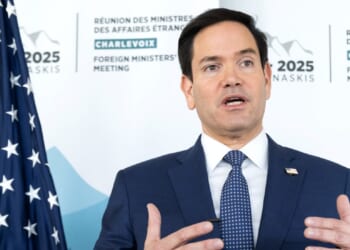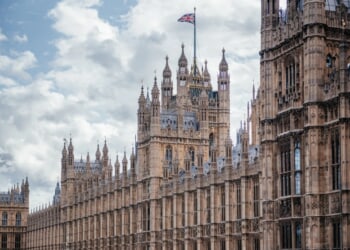Mark Littlewood is Director of Popular Conservatism.
Never discuss process. Only discuss outcomes. That was the first key rule of political communications which I was taught about three decades ago.
The idea is that you want to tell the public about what you are doing and where you are going. You don’t bore them to death with detailed cartographical information about how you decided upon and planned your journey. Voters aren’t interested in algorithms; they are interested in impacts.
In the area of fiscal policy, this should mean that the battlelines are pretty clear. Some will argue for tax reductions to improve living standards and stimulate growth. Others will defend a high tax burden as a necessity to secure decent public services. Opinions will similarly vary about what circumstances necessitate borrowing and to what extent.
However, it is now nearly impossible to debate tax and spend policy without considering the process, not merely the impacts. This is principally due to the long shadow cast by the prognostications of the Office for Budget Responsibility.
Henry Hill was right to point out in these pages that the OBR has influence rather than power. Politicians can choose to ignore the OBR’s advice or even refuse to seek it, as Liz Truss did in her 2022 mini-budget. There is nothing illegal or unconstitutional about taking such a course of action.
Sadly, the swift collapse of the Truss administration has led politicians of all stripes to draw exactly the wrong conclusion.
The market turmoil in the wake of the mini-budget was in large part caused by the actions of the Bank of England (about two thirds of it, according to their own report). There may also have been a market judgment that there was insufficient appetite for spending constraint on the Conservative benches. Truss’s view that welfare benefits should rise with the relatively low wage growth rather than very high inflation at the time wasn’t acceptable to a large tranche of Tory MPs.
The practical ability of the government to exercise reasonable fiscal constraint and to enable prudent tax cuts was, therefore, rightly questioned.
The fallout has been to seek succour in the apparently neutral, non-political economic modelling of the OBR. The corrosive effect of this is that we now implicitly believe that unknowable future events can be precisely anticipated if only we lean on the opinions of experts who are one step removed from the political process.
This isn’t to besmirch the good intentions of the OBR’s staff. It is to point out that they are being asked to do an impossible job.
By way of analogy, you might reasonably rely on a weatherman to tell you the likelihood of snow falling in the UK between now and some future date. This will render some sort of percentage estimate that is likely to be better than a random guess. However, if you ask a meteorologist exactly how many snowflakes he anticipates will fall in Cleethorpes in December 2029, you will get an answer too precise but too uncertain to have any real informative value.
This is where we have now got to with the OBR. Their broad assertion that we can probably expect economic growth to be disappointing by historical standards between now and the end of the decade is likely correct, but also unsurprising. Anticipating that GDP growth will be 1.8 per cent in 2029 is so precise as to be almost certainly wrong.
In an attempt to show how preposterous such precision is, I have swiftly developed three different economic forecasting models and intend to compare them to the OBR’s numbers between now and the end of the decade.
The first model merely assumes the OBR has an inbuilt over-optimism. It takes the OBR forecasts and trims an arbitrary 0.4 per cent from this year’s prediction and 0.3 per cent from subsequent years. This model downgrades the OBR’s forecast from one per cent this year to 0.6 per cent and then projects 1.6, 1.5, 1.4 and 1.5 percent as opposed to 1.9, 1.8, 1.7 and 1.8 per cent.
The second model is simply a random number generator within certain limits. It assumes that British economic growth will always be between 0.5 per cent and 2.5 per cent per annum and simply generates a percentage to within a decimal point between these two boundaries. This model forecasts growth this year of 0.7 per cent this year, 2.0 per cent in 2026 and then 1.5, 1.4 and 0.8 per cent over subsequent years.
The third and final model does actually have a principle of sorts at work behind it. It assumes that the total number of goals in any given Premier League season is the key determinant of economic growth in five years’ time. The square root of the number of goals scored is calculated and then divided by 25 to determine the annual growth rate.
This yields a 1.4 per cent growth rate this year, followed by 1.3 per cent growth in each of the next three years and then a return to 1.4 per cent in 2029/30.
For the OBR’s forecasts to have any real value, they need not just to be better than these models but measurably and consistently better, given that spending decisions running into billions of pounds are based on them. The only exception to this is the first model. If that proves more accurate than the OBR’s current projections, they could simply add in my arbitrary pessimism numbers into whatever algorithm they currently operate.
The OBR was established by George Osborne with the intention that politicians should not be able to “mark their own homework”. But if we dig into this metaphor a little more deeply, it exposes how Britain is morphing from a democracy into a quangocracy. Politicians are not pupils in a secondary school who should be submitting their homework to aloof, unelected experts to mark. Politicians are the school staff, and the Prime Minister is the headmaster.
Hill and I would agree that the OBR is an example of successive governments having built themselves a “theatre of excuse-making”. The blame for this does not sit with the head of the OBR, Richard Hughes, and his platoon of staff and advisers. But neither should it prevent us from abolishing the OBR altogether.
This doesn’t mean that politicians should never listen to experts. It doesn’t mean the government should just make things up as they go along. But it does mean we might return to an approach based on broad principles rather than a mistaken belief that we can calculate the impact of fiscal policy to within a couple of millimetres.
It also could have the effect of us finally embracing Friedrich Hayek’s dictum that the curious task of economics is to demonstrate to men how little they really know about what they imagine they can design.





![Jasmine Crockett Justifies Mass Illegal Immigration With Bizarre Argument [WATCH]](https://www.right2024.com/wp-content/uploads/2025/03/1742007023_Jasmine-Crockett-Justifies-Mass-Illegal-Immigration-With-Bizarre-Argument-WATCH-350x250.jpg)

![NYC Tourist Helicopter Falls into Hudson River, Siemens Executive and Family Among Those Killed [WATCH]](https://www.right2024.com/wp-content/uploads/2025/04/NYC-Tourist-Helicopter-Falls-into-Hudson-River-Siemens-Executive-and-350x250.jpg)








